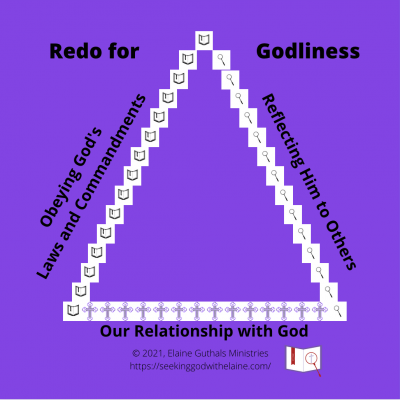
The September devotions were a learning experience for me. I hope they were for you.
As an update, the building I live in was sold. Thanks for the prayers.

Main Nuggetx
- Purpose #1 is to grow in godliness so we can expand His kingdom (Joy through Humility).
- What we may consider as nothing special is something special to God (Joy of Good Works).
- What the church has to realize is that we are not only disciples of Christ, but we are also ministers of Christ, regardless of our occupation. That is what God is all about — growing us so that we will tell others about the Plan of Salvation (Joy of Adversity; Joy through Humility).
- Knowing the power of the resurrection makes it a heart-level knowledge. We know this power in our justification, sanctification, edification, and glorification (Joy in Having Goals).
- Sin is not the opposite of being perfect. Rather, it is in disagreement with perfection. What I am getting here is that, though we are mature, adults, or strong in our faith, the stain of the sin is still there. It will still be there while we are imperfect disciples (Joy in being Mature in the Faith).


Our Relationship with God
- Joy comes to us through prayer. Communion with God brings joy as does being concerned about others (Joy in Prayer).
- We can’t sanctify ourselves. Only the Holy Spirit can. It is Him working in us that changes us to be more like God (Joy of Good Works).
- Disciples are to imitate Jesus in being humble and disinterested (Joy in Submitting).
- We forget that God is right there to help us be successful in what He asks. He is not asking us to do this alone (Joy through Humility).
- God never leaves us. We leave Him. However, at times, we may think He is silent when He is just working out the conditions so we can take the next leap in our faith (Joy in Sanctification).
- God is fighting beside us. God is fighting for us when we can’t (Joy in Sanctification).
- The bottom line is we have to submit to God through trust, obedience, and goodness. It is all about our spiritual condition (Joy of Good Works).
- It should give us comfort that Jesus will be exalted. He was faithful and obedient. That means we will be rewarded because of our faithfulness and obedience, too (Joy in Submitting).
- Does “so that at the name of Jesus every knee will bow …” (Phil. 2: 10 CSB) mean the literal bend the knee? I have always thought so. It might mean submission. He equated name with power. That would read something like “because of the power of Jesus every knee will bow” (Joy in Submitting).
- What is important to me is that the ones doing the bowing will be “… in heaven and on earth and under the earth” (Phil. 2: 10 CSB). That means everyone — dead and alive, believers or not. Every person who ever lived without any exceptions will bow to Jesus (Joy in Submitting).
- Jesus wasn’t exalted in His humility. He was exalted because of His humility (Joy in Submitting).
- Why did Jesus have to humble Himself? If He hadn’t, God would never have accepted His Sacrifice. If God didn’t accept Jesus’ Sacrifice, there would have been no acceptable Sacrifice (Joy in Submitting).
- It is important that we do the work God’s way. Our work will be tried by fire in the day of the Lord. The day of the Lord is when we will be called home to Heaven (Joy of Good Works).
- God’s word does not return void. His work will be done (Joy of Adversity).
- The motive for serving God may not affect the complexion of the service, but it will affect the accomplishment of it (Joy of Adversity).
- We must work for salvation, and that isn’t easy. God cutting sin out of our lives hurts. God changing our character hurts (Joy in Sanctification).
- God’s working in us is not going to be so we can only do acts of kindness. Yes, that is the second greatest commandment. More importantly, God is working in us so that He can do His good Will. We must do the first greatest commandment before we can even think about accomplishing the second greatest commandment (Joy in Sanctification).
- It isn’t just about doing good. It is about doing God’s good (Joy through Humility).
- The gospel is about Jesus, not us. It is about His message, not that we are proclaiming it (Joy of Adversity).
- Being in Christ means being united with Him through faith, walking in the Spirit with Him, and living for Him (Joy in Knowing Jesus).
- If the other religions are preaching the essential doctrines, we should be good with it. We don’t have to agree on all of the interpretations (Joy of Adversity).
- It is through God’s grace that we live and not die. It is through God’s grace that we leave this life and begin our eternal lives with Him (Joy of Living and Dying).
- Every person is going to be a witness to God rewarding Jesus. His dignity will be restored (Joy in Submitting).
- The growth only comes by God’s power. There is no checklist we can mark off to make sure we are progressing as required. There is nothing we can do (Joy of Perfection).
- God sees everything, even our thoughts (Our Conscience and God’s Omniscience and Judgment).
- When we choose the evil, God will judge us (Our Conscience and God’s Omniscience and Judgment).
- God will give us time to repent. But the time God allots for that repentance is limited (Our Conscience and God’s Omniscience and Judgment).
- God wants us to wait on His provision. He will give us what is best for us (Buckling Down Our Hearts and Lips).
- God doesn’t want us to have even the stain of sin. He wants us to be pure (Buckling Down Our Hearts and Lips).
- We think we don’t need God when God wants us to depend on Him. God doesn’t want us to be self-sufficient. He wants us to put our trust in Him that He will provide our needs (Recognizing Evil Thoughts).
- God shows us how to mourn our repeated commission of the sins. We should be sad that we were not obedient as God expects — that we keep sinning (Recognizing Evil Thoughts by Hating Sin and Resisting Satan).
- God teaches us this aversion and mourning through the sanctification process. It is only through this process where we show that we hate sin does our spiritual life truly begin (Recognizing Evil Thoughts by Hating Sin and Resisting Satan).
- We can resist the devil only through God’s power. That means reading and hearing God’s Word and listening to the promptings of the Holy Spirit (Recognizing Evil Thoughts by Hating Sin and Resisting Satan).
Glossary


Obeying God’s Laws and Commandments
- Where we spend eternity is going to be based on our spiritual condition. There is a question with only two answers: have we ABCDed or not (Joy through Humility).
- Jesus won’t be separating the sheep and goats because of what they did or didn’t do (Joy of Good Works).
- Whether we are a success or not is not the point. The point is that we are doing what God asks. We are obedient to Him (Joy of Good Works).
- Paul was talking about being worthy of the gospel. It wasn’t just about finding the unity. It was about standing firm in the gospel. That is how we prove our salvation to God. Yes, He knows our hearts, but we must show that it is heart knowledge, and not just head knowledge (Joy through Humility).
- The strong and the faithful are who Satan targets. He doesn’t need to target the weak and faithless (Joy of Good Works).
- We have to be genuine or sincere about our relationship with God. That means we have to be spotless, pure, and clear. Spotless and pure mean that we are sin-free. I would say that clear means the same thing (Joy in Relationships).
- God doesn’t promise that we will have a stress-free, trial-free life. This is equally true if we are ministers of the gospel. Because we are disciples of Christ, we will be persecuted. There is no way around it (Joy of Adversity).
- We are all ministers for Christ (Joy of Adversity).
- We magnify Jesus in death when we don’t fear it. We don’t cling inordinately to this life but completely trust that God knows what is best for us — even taking us out of this world (Joy of Salvation).
- God wants our attitude to be that we are devoted to the Christ of the gospel regardless of the circumstances. Put Him squarely in control and praise Him no matter the circumstances (Joy of Living and Dying).
- I think, for many, it all boils down to how we react when we are going to be transitioning from this life to the next. Which, then, has the greatest pull? (Joy of Living and Dying).
- Our motives are supposed to come out of love. We our supposed to show Christ’s love for others through our actions (Joy through Humility).
- This inward feeling of unity must show itself in the outward actions (Joy through Humility).
- When we become a new creation, part of it is learning to balance the tugs from both sides. Both are needed because we should be content — even excited — about the work God is asking us to do in this life. But we are to long for a life with Jesus in eternity (Joy of Living and Dying).
- All disciples must have some degree of love in our hearts we have to love God, or we have not made a true confession. We must love others, or we are not progressing on the Sanctification Road (Joy through Humility).
- We can’t think this love is just about people. We must love the doctrines the same way. We must be committed to following God’s laws and commandments the same way (Joy through Humility).
- We must stand up for God’s laws and commandments. If we don’t, there is no way they will find salvation (Joy through Humility).
- We can’t substitute science for God’s moral power. Our intellect won’t cut it either. Politicians can’t regulate it into existence — or regulate evil out of the world (Joy through Humility).
- We are made in the image of God, so His glory is within us. Jesus didn’t have to give that up to become human (Joy in Submitting).
- But we would never have been able to meet the needs for being a sacrifice. Mankind was not pure after Adam and Eve bit (Joy in Submitting).
- Working out our salvation is all about obedience. We are obeying God and becoming more like Him. We are obtaining His character (Joy in Sanctification).
- Working out our salvation is done within us. God influences our will and actions to change our character to imitate His (Joy in Sanctification).
- Paul said that we need to work out our salvation with fear and trembling. When we talk fear of the Lord, we say this means reverence. I think it does here, too. With the trembling added, I think it does mean more than just reverence. No, it doesn’t kick it to bone-chilling terror. We have to be on constant watch. We have to be on guard for temptations.
- We have to change to get God’s mindset. We have to change to serve Him (Joy in Sanctification).
- We can’t say grace gives us a pass on having a personal relationship with God. We can’t say Jesus’ blood covered everything, so there is nothing left for us to do. We can’t approach this as it is fire insurance (Joy in Sanctification).
- We have to align our character with God’s. That will take diligent, committed work (Joy in Sanctification).
- We can’t say that Jesus isn’t coming in our lifetime, so we don’t have to make a decision on whether to follow God or not. Our lifetime will still be over one day. The decision to follow God has to be made before then. Any non-decision is a decision to not follow God (Joy in Sanctification).
- Unfortunately, we not only don’t see God fighting our battles, but we also don’t see Him working in us (Joy in Sanctification).
- God doesn’t want us to complain about doing His work. We need to see it as necessary – for ourselves and for others. If we do it while complaining at the top of our lungs, it can be construed that we are just doing it to get the blessings (Joy in Sanctification).
- When we complain against God, we show our doubts regarding His wisdom, goodness, and power. Instead, we need to live as true children of God (Joy in Sanctification).
- We have to consistently be working on changing ourselves to be like God. While we are doing that, we need to be witnessing to others (Joy in Sanctification).
- It comes back to obedience and submission. We must do things His way, not ours. This is just another way we are different from the worldview people (Joy in Sanctification).
- Doing so, produces joy. When we are obedient and submissive to God, we receive blessings, which brings with them His joy (Joy in Sanctification).
- If we put our trust in the temporary things of this world, we will lose everything. If we put our trust in Christ, we will gain our soul — and everything (Joy in Knowing Jesus).
- What is our decision is whether we are going to submit our lives to God. God doesn’t force us to worship Him. But once we choose Him as our Father, once we ask Jesus to be our Lord and Savior, we have to be all in. We can’t pick and choose what we are going to believe and what we aren’t. It is God’s way or the highway. That is why Jesus told us to count the cost before choosing to become His disciple (Joy in Knowing Jesus).
- Those of us who truly prize Jesus as our Savior and Lord have nothing to worry about. That means we need to keep doubts out of our minds. Doubts eat at our faith (Joy in Knowing Jesus).
- When we are a disciple of Christ, we bury ourselves in the gospel, which is the biography of Jesus. It tells about Who He is, what He has done, and what He will do (Joy in Knowing Jesus).
- Living in Christ means abiding in Him. That means we persist and endure through all this life has to offer (Joy in Knowing Jesus).
- We will be glorified when we are resurrected from the dead (Joy in Having Goals).
- We can be certain that we all will be resurrected — where we will spend eternity depends on whether we have ABCDed or not (Joy in Having Goals).
- Our resurrection, along with everything else, is a gift from God (Joy in Having Goals).
- God does not require that we be successful by our own definitions. That would probably smack of a lot of worldview definitions (Joy of Perfection).
- We grow as we go along. What satisfied us when we were milk babies does not satisfy us now that we are steak adults (Joy of Perfection).
- I think God wants us to be at least a little depressed that we have broken His laws and commandments. He doesn’t want us to feel cavalier about it (Joy of Perfection).
- We should determine what we think God is looking at as the ideal character and work toward it (Joy of Perfection).
- We must remember that our future relationship with God isn’t dependent on where we’ve been. We’ve said that God is sanctifying us so that we become as He is (Joy of Perfection).
- We must remember God comes to us as we are. We could be a murderer or a liar. He still loves us. God doesn’t want us to stay there. He wants us to become as He is (Joy of Perfection).
- God only wants us to remember so that we can see from where He has brought us. He wants us to see success as becoming more like Him. I would say God wants us to watch and pray more than He wants us to remember (Joy of Perfection).
- We generally think God is wanting us to forget about those attractive sins and those friends who encouraged us to commit them. We usually don’t think about that it is our having to give up past good works (Joy of Perfection).
- Paul wanted us to get one thing if nothing else — we have to pursue God even after conversion (Joy of Perfection).
- God and His sanctification of us has to be our priority (Joy of Perfection).
- We will still be learning of God as we spend eternity with Him. I can see that (Joy of Perfection).
- Our goal is to live up to that doctrine God has revealed to us. This can’t be hit and miss. We have to persevere (Joy in being Mature in the Faith).
- God calls us to walk in the Spirit daily. We aren’t to turn left or right (Isa. 30: 21) (Joy in being Mature in the Faith).
- God doesn’t want us to be extremists. He wants us to follow His path (Joy in being Mature in the Faith).
- We build our character with the building blocks of thoughts, actions, and feelings. But it is easy to forget about what made us us. When we add this to we don’t always see sin as sin, it really makes it a scary thought. How are we ever going to be perfect and forego judgment? The answer is that God looks at our hearts. God is looking to make sure we are sincere and genuine. He knows we aren’t going to be perfect until we get out of these sinful bodies. But how hard are we trying? Are we even wanting to be moving in the right direction? (Our Conscience and God’s Omniscience and Judgment)
- Our hearts are the root, so we must guard them, also (Buckling Down Our Hearts and Lips).
- Our character is really at our heart level. If that is wrong, the lips are probably going to shoot out something that is wrong (Buckling Down Our Hearts and Lips).
- Wrong actions cannot be applied or done in a situation. We have to guard against choosing to do what God doesn’t want us to do. But we also can’t make them our custom. They can’t become standard operating procedure (Buckling Down Our Hearts and Lips).
- God wants us to have a realistic viewpoint. He knows we have to truthfully evaluate our lives so that we can determine where we are at on the Sanctification Road and where He is calling us to make the necessary changes in our characters (Buckling Down Our Hearts and Lips).
- God wants us to wait silently on Him, not compare ourselves to worldview people who are considered successful. But that doesn’t mean we aren’t doing anything. We are trusting God. Resting and waiting are actions because they are conscious decisions (Buckling Down Our Hearts and Lips).
- God wants us to make a fair and true assessment of ourselves. If we don’t, we may not get all of the sin cut out of our lives (Buckling Down Our Hearts and Lips).
- God tells us several times in His Word to evaluate ourselves based on His standards (Evaluating Our Evil Thoughts).
- First, we need to make sure we know the goal we are trying to reach. Be holy, because I am holy (I Pet. 1: 16 CSB) (Evaluating Our Evil Thoughts).
- We have to figure out where we are at and what we need to to do to get to where God wants us to be (Evaluating Our Evil Thoughts).
- It is important that we do not lose the initial joy of our conversion. We don’t want to go backwards. We don’t want to lose our first love. It is the spiritual love we shouldn’t lose (Evaluating Our Evil Thoughts).
- Meditating is when we evaluate our lives by thinking things through (Evaluating Our Evil Thoughts).
- Really, when we are meditating, we are seeking God. But it is also more than that. It is applying what we are hearing and reading (Evaluating Our Evil Thoughts).
- We will only grow when we think it through. If our faith is described as beliefs, a.k.a the assent of the mind, it will only grow through exercises of the mind (Evaluating Our Evil Thoughts).
- We should evaluate every part of ourselves. Our guide should be the Scriptures. It shouldn’t be what I say or what someone else says. It should be what God says (Evaluating Our Evil Thoughts).
- We use our evaluation to educate our thoughts to increase our worship and use our worship to educate our thoughts (Evaluating Our Evil Thoughts).
- I think God’s end goal is to have us worship Him. We have to have His character so we can enter Heaven, but once we are there, we will worship Him for eternity (Evaluating Our Evil Thoughts).
- Worshiping God puts us in communion with Him. When we are talking with Him and listening to Him, that focuses our thoughts on the promptings of the Holy Spirit (Evaluating Our Evil Thoughts).
- Talking to God and listening to Him is a form of worship (Evaluating Our Evil Thoughts).
- Meditation is the preparation for prayer. How many times do we just start praying with no forethought? (Evaluating Our Evil Thoughts)
- If we look at it as meditation is where we evaluate our lives, meditation informs our prayer, and prayer informs our life. We see God’s hand controlling our lives. This is what He wants. I don’t think it is just because God wants to control us. It is more that we are putting God as our priority. We are giving Him the controls.
- When we evaluate ourselves, we focus our thoughts on God. It will help us corral the evil thoughts with which Satan tries to trip us up (Evaluating Our Evil Thoughts).
- We need to make sure we reverence the Lord (Recognizing Evil Thoughts).
- The problem with fearing the Lord is we many do not hate the evil behind the sin. We just hate getting caught and punished. We only start to hate evil when we are forgiven (Recognizing Evil Thoughts).
- We have to do more than just understand God’s ways. We have to treat sin the same way that God does (Recognizing Evil Thoughts).
- That means we have to embrace God’s ways and abhor sin — even if it is our pet sin. Even if it is something we feel is small — like our thoughts (Recognizing Evil Thoughts).
- So, fear of the Lord can’t be just a mind thing. It has to be an action thing because it is a character thing. Fear of the Lord is what draws us to Him for salvation (Recognizing Evil Thoughts).
- We have to be so like God that we wonder who is doing the talking — God or us. We have to be the character of God. Outside of God, we never will be able to understand things (Recognizing Evil Thoughts).
- We need to make sure our image of ourselves is correct (Recognizing Evil Thoughts).
- When we think about being good enough by ourselves, that is not fearing God. That is arrogant pride. Pride is on the checklist we looked at in Living in Faith and Love to determine what is evil. Jesus told us that pride of life was one of the three things to avoid in this world (Recognizing Evil Thoughts).
- Pride is a sin because it takes our focus off God. In fact, the root of the unwillingness to seek God is pride (Recognizing Evil Thoughts).
- We can’t want to understand everything so that we can say we don’t need God since we have figured it out. That isn’t what God wants (Recognizing Evil Thoughts).
- We not only are faulty in how we see ourselves, but we also do not see the standard of character correctly. God tells us several times in His Word to evaluate ourselves based on His standards (Recognizing Evil Thoughts).
- We need to keep our speech honoring God (Recognizing Evil Thoughts).
- Profanity focuses on our being irreverent to God (Recognizing Evil Thoughts).
- We should make our conversations count. God wants us to use our conversation to tell others about Him, promote unity, and knit the family together. He wants us to tell others of the good He is doing in our lives (Recognizing Evil Thoughts).
- When we fear God and give honor to Him, we want to serve Him. The fear is all about the reverence and love. That leads us to doing the good works for which we were made (Recognizing Evil Thoughts).
- We show God that we love Him by hating evil (Recognizing Evil Thoughts by Hating Sin and Resisting Satan).
- We have to show God that we hate sin. We hate what He hates (Recognizing Evil Thoughts by Hating Sin and Resisting Satan).
- No, we don’t do a good enough job at hating sin. We especially can’t compromise with the worldview attitude that we have to show love by tolerating sin (Recognizing Evil Thoughts by Hating Sin and Resisting Satan).
- It is really important that we hate sin. Sin is what keeps us separated from God. We don’t want to be separated from Him (Recognizing Evil Thoughts by Hating Sin and Resisting Satan).
- Why doesn’t God just take away our ability to sin? If He would, He would take away our free will (Recognizing Evil Thoughts by Hating Sin and Resisting Satan).
- God wants us to decide that something is a sin based on His laws and commandments. He will teach us how to conquer sin (Recognizing Evil Thoughts by Hating Sin and Resisting Satan).
- The focus of our hatred is all sin, not just the ones we or the world deem are sins. We hate all that God says are sins in His laws and commandments (Recognizing Evil Thoughts by Hating Sin and Resisting Satan).
- The way God teaches us to hate sin is by using our past sins to fuel our aversion to them. We get disgusted with ourselves for slipping back into our sinful habits (Recognizing Evil Thoughts by Hating Sin and Resisting Satan).
- We are to hate the sin in ourselves and hate the sin in others. In a way, we kind of walk a fine line. So, the focus of our hatred is sin, not the person sinning (Recognizing Evil Thoughts by Hating Sin and Resisting Satan).
- We resist the devil by submitting to God (Recognizing Evil Thoughts by Hating Sin and Resisting Satan).
- Satan is going to do everything in his power to get us to break God’s laws and commandments. We have to resist him (Recognizing Evil Thoughts by Hating Sin and Resisting Satan).
- It is our choice and ours alone to sin. Satan didn’t force us to do anything. He doesn’t have that much power (Recognizing Evil Thoughts by Hating Sin and Resisting Satan).
- We have to resist Satan in our inward and outward walk. It isn’t just what we do. It is what we think (Recognizing Evil Thoughts by Hating Sin and Resisting Satan).
- We can’t be passive in our salvation. We have to fight to stay in God’s Will (Recognizing Evil Thoughts by Hating Sin and Resisting Satan).
- Since we are made in the image of God, a part of us yearns to be reunited with Him. The problem is our sinful nature. It is so strong in us that it counteracts that yearning (Recognizing Evil Thoughts by Hating Sin and Resisting Satan).
- Worldview people don’t want our salvation to hinge on hating evil. They want it to be on the condition that we are a good person. That doesn’t work. We can be a good person without loving God. That isn’t what God is after (Recognizing Evil Thoughts by Hating Sin and Resisting Satan).
- We watch for God to work in our inward and outward lives (Recognizing Evil Thoughts by Watching).
- It isn’t all just watching for the bad stuff. It is watching for God. Sometimes, we have to really pay attention, or we will miss opportunities — to serve and for God’s blessings (Recognizing Evil Thoughts by Watching).
- We can only be watching when we open the eyes of our hearts. Really, the opposite of having evil thoughts is opening the eyes of our hearts. When we open ourselves to God, we look above our understanding to God. He may be doing the impossible thing in our lives, but He can (Recognizing Evil Thoughts by Watching).
- To me, opening the eyes of our hearts means that we put our full faith in God. We acknowledge that God is living within us and we are obedient in responding to Him. We are submitting to Him (Recognizing Evil Thoughts by Watching).
- Most of all, we need to actively watch for Jesus’ return (Recognizing Evil Thoughts by Watching).
- Watching and waiting does not mean doing nothing (Recognizing Evil Thoughts by Watching).
- We aren’t doing nothing. We are putting our trust in Him that He will work in the fullness of His time (Recognizing Evil Thoughts by Watching).
- We have to watch that we don’t get discouraged when Jesus doesn’t come when we think He should. Our charge was to watch until He came (Recognizing Evil Thoughts by Watching).
- We can talk a blue steak and tell God how wonderful we are. God knows better. He knows our hearts (Recognizing Evil Thoughts by Praying).
- God isn’t looking for a marketing campaign where we feel like we have to sell ourselves to Him. He is looking for us to recognize His eminence over us (Recognizing Evil Thoughts by Praying).
- We have to be contrite about our sins. Our proud, entitled attitude has to be changed into a humble, repentant one (Recognizing Evil Thoughts by Praying).
- Instead of searching for God and loving him, we are deceiving ourselves when we think we can be self-righteous. That is not the way to salvation and eternal life. How are we self-righteous? We are when we think being a good person is good enough to get us eternal life (Recognizing Evil Thoughts by Praying).
- Paul knew our character needed strengthened, and that we couldn’t strengthen it on our own. We can’t do our redo on our own (Recognizing Evil Thoughts by Praying).
- We can train our good thoughts to focus on God (How Do We Focus on Good Thoughts?).
- We can train our minds to change from focusing on sinful thoughts to focusing on God. He called this renewing our minds (How Do We Focus on Good Thoughts?).
- If we don’t corral our thoughts, we not only can slip further and further away from God, but that also brings a helplessness with it (How Do We Focus on Good Thoughts?).
- God doesn’t want us to be ignorance. He not only wants us to have knowledge, but also to have wisdom (How Do We Focus on Good Thoughts?).
- Our thoughts shouldn’t be random thoughts. They should be organized to help us grow our relationship with God (How Do We Focus on Good Thoughts?).
- When we obey the law, we gain the fruits of righteousness (How Do We Focus on Good Thoughts?).
- Rejoicing brings the spiritual graces of faith, hope, love, and patience. The results of our continual rejoicing, praying, and thanksgiving are singing, communion, and working for God (Focusing on Privileges and Commandments).
- We should rejoice in every aspect of the gospel. All the doctrines and promises lead us to God, the most important thing in our lives (Focusing on Privileges and Commandments).But that doesn’t mean we wait until the trial is over and we see how it is good for us. We gives thanks in the middle of the trial because we know — however hard or painful it is — God is using it for good (Focusing on Privileges and Commandments).
- Distractions are just are frequent and are as difficult to corral as our thoughts. They are not considered sins while we strive to lessen their hold over us (Focusing Completely on God).
- We can choose what our thoughts focus on, or that on which we refuse to dwell. It is up to us. God will help us (Focusing Completely on God).
- Speech is important but can be impacted by what we see or hear. What we see is important, but maybe we’ve heard or seen something that is contradicted that. It is easy to go down a wrong path. When we think about it, we must use all these parts together to function. We can use our eyes to see, but we need our minds to interpret what we are seeing and what that means to us. We aren’t going anywhere without our feet taking us. God calls us to submit our whole lives to Him. Not just our mouths and speech. Not just our minds and thoughts, (Focusing Completely on God)
- Our focus has to be solely on God. We need to have the faith of a child. Focusing our thoughts is an important component in focusing ourselves on God. We have to focus our eyes and ears on God along with our hearts and minds in order to direct where our feet go. Focusing our hearts, eyes, ears, feet – all of us – on God is important in our sanctification process (Focusing Completely on God).


Reflecting Him to Others
- God wants us to remember is each other. It strengthens our unity when we pray for each other (Joy in Prayer).
- It is the mission of the church to expand God’s kingdom. We have to do that through fellowship and peace.
- God wants us to build relationships with other disciples. He wants us to have unity and work together to further His kingdom (Joy in Relationships).
- We are to celebrate the growth of others in their relationships with God (Joy in Relationships).
- Yes, we need to grow in our love for each other. But that won’t mean a thing is we don’t grow our love for God and Jesus (Joy in Relationships).
- We are to use our experiences to witness to and encourage others (Joy of Adversity).
- How we handle the adversity can be our witness. (Joy of Adversity).
- We are to accept other ministers if they are preaching about the true gospel, regardless of the difference they have to us (Joy of Adversity).
- We have to be unified with those who truly believe that Jesus is their Savior and Lord (Joy of Adversity).
- What tolerance is, is a generous belief in the strength of the gospel and its ultimate victory over evil (Joy of Adversity).
- We can be a part of someone else’s ministry because we pray for them. It doesn’t mean we shouldn’t do ministry ourselves. But we can add our prayers to theirs (Joy of Salvation).
- Disciples know that death can be used by God to teach others (Joy of Salvation).
- This unity is based on Christ and can only be found through Christ. It encompasses disciples agreeing on doctrines and purpose — and doing that while loving each other (Joy through Humility).
- Paul identified part of the cause of disunity as selfish ambition and conceit (Joy through Humility).
- We act out of compassion and sympathy. We strive help others grow in grace (Joy through Humility).
- A way to remedy selfish ambition and conceit is to put the needs of others first (Joy through Humility).
- When we put someone else’s needs before our own, we glorify God (Joy through Humility).
- If we don’t put the needs of others first, we are breaking God’s laws and commandments. That not only hurts us, but it also hurts others (Joy through Humility).
- God doesn’t want us to shirk our responsibilities. He wants our helping others to be an equal responsibility (Joy through Humility).
- God wants us to pray for and encourage others. He wants everyone to do that (Joy through Humility).
- We have responsibilities to others whether we are rich or poor or an introvert or an extrovert. We are called to love one another (Joy through Humility).
- Helping others does not qualify us for a relationship with God. Only ABCDing does that (Joy through Humility).
- Our salvation is our first obligation. The second is the salvation of others. No, the second obligation isn’t just to love others. It is to introduce them to Christ (Joy through Humility).
- We don’t grow if we don’t have others challenging what we believe. We don’t want to not grow (Joy through Humility).
- We all navigate the Sanctification Road, but it means different things to each of us. Each of us has different issues we must work on. We’re still working the sanctification process. We just work it out differently. True, there are some things I bet we all work on. More than likely, we all work on love for God and love for others (Joy in Sanctification).
- What Paul was saying is the Philippians should imitate him because he was imitating Christ (I Cor. 11: 1). He also acknowledges there are others that they could imitate (Joy in being Mature in the Faith).
- God does give us godly men and women from whom we can learn much. Through them we see God’s laws and commandments in practice. That goes back to the community that God wants us to build. He wants family, fellowship, and unity. It would be logical that it would include role models. It is all predicated on love (Joy in being Mature in the Faith).
- It isn’t natural growth. Worldview people are wrong if they think they can get there without God. We get there through sanctification. We have to cultivate the seed. That means we have to seek God (Our Conscience and God’s Omniscience and Judgment).
- What is bad is when our own pride affects how we view others (Buckling Down Our Hearts and Lips).


To read devotions in the Redo for Godliness series, click the appropriate button below.
